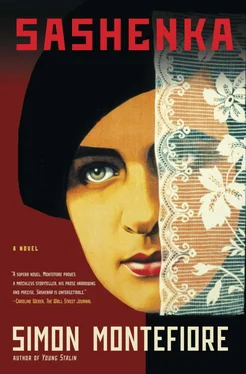Sashenka fell to her knees, her hands clasped. She wanted to cry too. Sagan’s hand came to rest on her shoulder.
“Pull yourself together, Mademoiselle Zeitlin. You’ve got to get her out of here now ,” said Sagan, donning his derby hat. “I’ll help you.”
Sashenka and Sagan took Ariadna by the arms and dragged her to the door.
On the landing, Ariadna started screaming again. “Grigory, Grigory, where are you? We need you to soothe our souls and forgive our sins! Grigory! I’ve got to wait for him! He’ll come back for me…” She struggled out of their hands, scratching and kicking, and tried to bolt back into the apartment but, moving fast, Sagan caught her.
“Gentlemen, we could do with a hand!” he called to the two city policemen guarding the door. One of them took Sashenka’s place on Ariadna’s left arm; Sagan took the right. The other policeman pulled down his hat, and in a fluid motion swept up Ariadna’s two feet in his arms. The three of them carried Ariadna down the stairs, her dress riding up to reveal the shreds of her stockings and her bare legs.
Sashenka averted her gaze and walked ahead of them, horrified and helpless yet grateful for their assistance. She crossed the courtyard, feeling the eyes of the policemen on her, hoping they would not know that this mess was her mother. Pity and shame engulfed her.
A car with a gendarme sergeant at the wheel was backing through the archway into the courtyard.
“Get her inside,” said Sagan breathlessly. Another gendarme opened the back door and helped guide Ariadna into the compartment. “Take her home, Sashenka.” Sagan slammed the door. “Good luck.” He leaned in toward the driver. “Thank you, Sergeant. Greater Maritime Street and fast!” Sagan banged the roof of the car.
Sashenka was alone in the compartment with her mother—and it took her back in time to the years after the revolution of 1905. She could just remember the Cossack horsemen and the furious shabby crowds and how Zeitlin had sent them out of Russia, to the west. They had traveled through Europe in a private railway carriage. Ariadna, always soused even then, wore scarlet brocade and held court at the Grand Hotel Pupp in Carlsbad, the Carlton in Nice, Claridge’s in London, always accompanied by some new “uncle.” There was the pink-cheeked Englishman, a Guards officer with a gold breastplate and a bearskin hat; a nimble Spanish diplomat in a frock coat; and Baron Mandro (known to Sashenka as “the Lizard”), an aging Galician Jew with an eye patch, rouged cheeks and hairy hands like cockroaches, who had once patted her bottom. When she bit him—she could still taste his coppery blood on her tongue—Ariadna had slapped her. “Get her out of here, vicious child!” and Sashenka was carried out of the room, struggling and screaming. And now, a decade later, Ariadna was being carried out, kicking and howling.
Sashenka peered out of the window. She longed to be in the streets, factories and safe houses with her comrades, away from this domestic farrago. The restaurants and nightclubs were filled with people. Whores trooped past St. Isaac’s toward the Astoria dressed in so much scarlet, gold and shining leather that through the snow and darkness Sashenka thought they resembled a regiment of Chevalier Guards. St. Petersburg was in a fever. Never had the stakes in the poker games been so high, never had there been so many revelers, so many limousines outside the Astoria…Was it the last mazurka?
As Ariadna’s head fell onto her daughter’s shoulder, Sashenka told herself she was a Marxist and a Bolshevik, and she had nothing to do with her parents anymore.
“Your guest is already here, mon baron .”
Zeitlin had asked a woman to meet him at the Donan at 24 Moika. At night the restaurant was crowded with ministers, nabobs, courtesans, profiteers and probably spies but during the day they held court in the foyer and café of the Europa Hotel. In the afternoon the Donan was deserted, which was why Zeitlin often used its private rooms to hold discreet meetings: it was here in his usual private dining room, known as the baron’s kabinet , that he had met the War Minister in August 1914 to clinch the deal to supply the army with rifle butts.
That morning he had called Jean-Antoine, the maître d’. Born in Marseilles, Jean-Antoine was celebrated for his discretion, his ability to recall everyone he had ever met, and his tact in resolving the most outrageous scenes.
“ Mais d’accord, mon baron ,” Jean-Antoine replied. “Your kabinet ’s ready. Champagne on ice? Your favorite crayfish? Or just English tea, English cakes and Scotch whiskey?”
“Just the tea.”
“I’ll send over to the English Shop right away.”
Zeitlin usually took the automobile but that afternoon he had donned his shapka hat with earmuffs, his black coat with the beaver collar and his valenki galoshes over his patent-leather grey shoes (from Lobb’s of London) and picked up his cane with the silver wolf’s head—and he had let himself out of his house without ringing the bell.
Zeitlin relished the anonymity of moving through the dark streets without chauffeur or footman. It was not snowing but the ice was grinding into an adamantine freeze all over again. He could almost hear the grey glaze of the Neva River fusing together its fractures and fissures. In the streets, the gas lamps were being lit, the streetcars clattering over their rails. Behind him, bells and laughter pealed. A sleigh bearing students crammed together and holding on for dear life slid past him and was gone. These days, youngsters did what the hell they liked, Zeitlin thought. They had no values, no discipline.
Was he happier now that he was rich? Look at his crazy wife! And there was his darling Sashenka, a riddle to her own father. He loved her and longed to protect her. Yet she no longer seemed interested in her own family. She was almost a stranger, and sometimes he thought she despised him.
He wished he could weep as freely as a child. Like an old man singing his school song, he found himself humming the Kol Nidre tune from his childhood, which told of a vanishing world. He had hated it then but now he wondered: what if it was the right way?
He popped into Yegorov’s, the bathhouse with its Gothic mahogany walls and stained-glass windows, and a page in white tunic and black breeches showed him to a cubicle. Stripping naked, he entered the icy bath and slipped under the iron bridge, draped in lush foliage, that arched over the water. Then he steamed for a while on a granite table. Several naked men, their bald heads and buttocks oddly alike in their pinkness and shininess, were being beaten with birch twigs. Zeitlin lay there ignoring everyone and thinking.
I’d pray to God if I were sure there was one, he told himself, but if he exists, we are just worms in the dust to him. Success is my religion. I make my own history.
Yet in his heart Zeitlin believed there was something out there greater than mankind. Behind his cigar smoke, studded shirt, frock coat, striped English trousers and spats, he was still a Jew, a believer in God in spite of himself. He had studied at the cheder, learning the Shulhan Aruk, the rules of living, the Pentateuch, the five books of the Bible that formed the Torah, the Jewish law, and the pedantic, wise, archaic poetry of the Talmud and the Mishnah.
After about an hour he dressed, splashing on his cologne, and walked back to Nevsky. The tall, glassy effulgence of the Fabergé shop glinted out of the darkness.
“Good evening, barin ! Jump in, I’ll give you a ride!” called out a Finnish sledge driver, flicking his whip and slowing his stumpy-legged ponies, their jingling bells ringing festively.
Читать дальше












